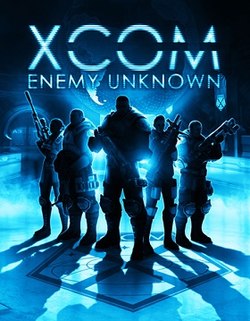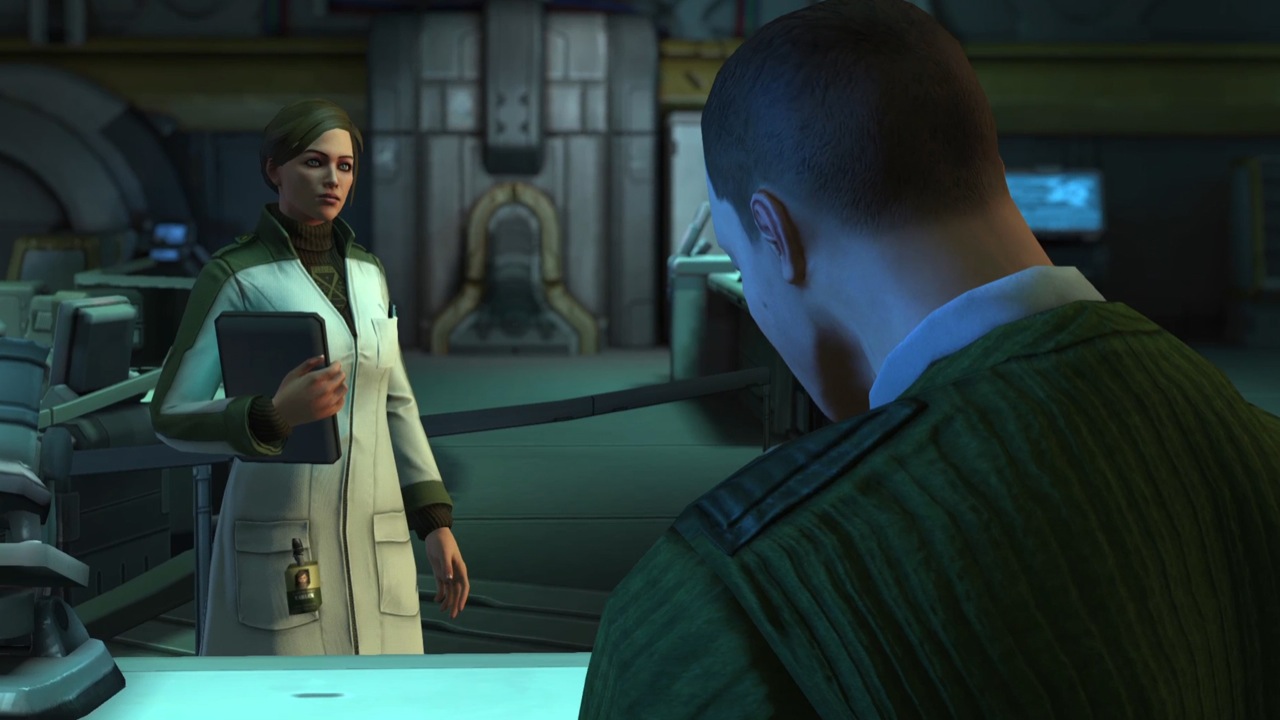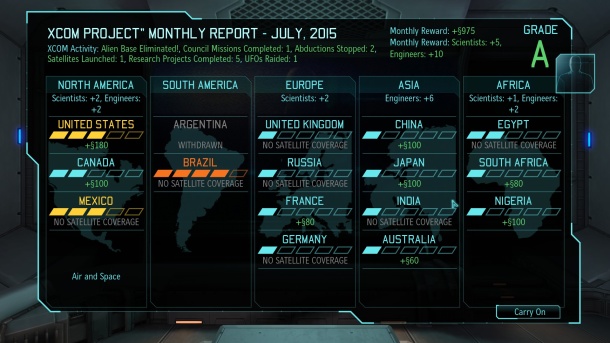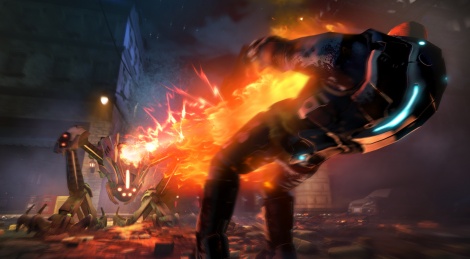- Graphics/Visual Effects 9
- Story Content 7
- Story Pacing 10
- Gameplay 10
- User Interface/Controls 9
- Soundtrack 5
- Replayability 9
- Completeness 8
- Support 10
- Originality 10
The graphics are not the selling point of this game, but strategy RPG’s as a whole do not tend to have great graphics. In this genre, XCOM is a pretty good looking game, especially when it comes to its effects (the different kind of gun shots and psionic powers) and highly detailed environments. The settings really look like earth after an alien attack and the detail that goes into the downed UFO missions is pretty astounding, with bits of the UFO scattered around the map to simulate it crashing. Therefore, while I think the graphics could have been slightly better, especially when it comes to the lackluster character faces, the game as a whole deserves a 9, especially considering it is in a non-graphics intensive genre.
Again, the story is not the driving force of this game; however, the first time through it is interesting and attention-holding as you discover more and more about the mysterious aliens. The story is highly linear, so even though the game has high replay value most of the story scenes will be skipped in second and subsequent playthroughs. Most of the actors are scientists and engineers talking about their findings, so it is interesting for hard sci-fi fans but not most players.
The formal story is almost solely told by Dr. Vahlen, your research scientist, who will outline the story for you as you make discoveries about the aliens.
The redeeming quality of the storytelling in this game comes from the player, as the story evolves in your head as you play with your soldiers. By the end of the story, it is absolutely heartbreaking to lose one of your colonel rank soldiers who you’ve led through many missions before because of the story that naturally builds in your head about your soldiers. In this way, the XCOM story does become nonlinear, but only to the player with imagination.
See the XCOM subreddit at www.reddit.com/r/xcom to see many different stories by players about their soldiers.
Despite having a lackluster story as far as content, the pacing of the story is as good as a player could hope. You decide how quickly to progress the story by determining when to engage in key attacks on the aliens. If you don’t feel prepared and want to upgrade your weapons or satellite coverage before progressing the story, feel free to wait another month. This system is very nice because players who prefer a slower game can do so, while those who want to rush can as well.
The gameplay is probably the factor that draws most people to this game. Part of the underrepresented but beloved “strategy role-playing game” (SRPG) genre, these game blends the deep character development systems of role playing games and the tactical challenges of strategy titles. This combination means that the player forms a personal bond with the characters; it is not just a generic marine you lose in a battle but a character whom you’ve specifically tailored to your play style and outfitted with your favorite weapons and armor. Likewise, it is not a matter of “grinding” levels like some RPGs and MMOs, but a difficult process of positioning and calculating risks to get your characters to progress.
The gameplay consists of two modes: the XCOM headquarters mode and combat. At the headquarters, players can plan their base–balancing the needs of your force with the space you have to build–and conduct research; after researching new items, the player needs to fabricate them in engineering. The many steps and the time elapsed between each step toward producing items forces the player to think in advance about what sorts of weapons/gear they want in order to plan the steps to fit the timeframe of the game.
Players must carefully balance global panic levels.
All of this, however, requires money and raw materials. Materials are recovered from the aliens after each engagement, but for funding, XCOM uses a system of satellite deployments over various countries of the world. As the aliens work against you, panic rises across the globe. Deploying satellites alleviates the panic in a country, gives the player additional funding each month, and allows the player to shoot down UFOs that fly over that country with interceptors, which must be built and maintained on any continent the player has satellites over. Panic levels must be managed over many different countries because if a month ends with a country in the highest panic level, it will withdraw from the XCOM project and no longer provide any benefits to the player. These various management issues mean that too many mistakes can easily get the player into an unwinnable situation if the competing interests of the game are not balanced properly.
Combat is turn-based, with each character having two actions available per turn. Each character can move once and shoot (or use an ability like overwatch) or move twice each turn. There is also a cover system, where full cover offers a large aim penalty to aliens attacking you and half cover offering a smaller one. Be careful, though, even if aliens miss a character, they have a chance of destroying the cover with their shots! Effective tactics–such as staying in cover and heavily using the “overwatch” ability–are the key to keeping your soldiers alive, as once they are gone, they are gone forever.
The controls and user interface for this game are fairly simple and easy to use, especially in the console version. Each squad member has two movement options and the user can decide who moves first and can even have a squad member take one action and then wait for another to do something before making the second action quite easily. This system allows a great degree of flexibility in squad management. Also, all attack options and skills are included in a squad member’s attack menu that is easily accessible but not in the user’s way when moving. As a whole, the controls are intuitive and easy to learn.
The soundtrack is one of the weaker elements of this game. There are only a few tracks in the game that play over and over again and almost all the soundtrack is either building orchestral pieces that never reach a cadence or weird alien sounds. The problem with this approach is that the music gets stuck in your head but it has no real substance and is quite annoying.
Replayability is high for this game primarily because most players will need to start at easy or (maybe) normal difficulty level in order to win the first campaign. If the user tries to go too big too soon, they will probably get into an unwinnable situation and have to start over. The beauty of XCOM’s design is that these sorts of restarts are not all that frustrating because each time the player feels like he or she has learned something new that will help him or her to succeed next time.
Players will likely need to replay this game just to finish it.
Not only this, but the game adds options for randomizing soldiers’ starting stats and growth patterns, allowing the user to play a new type of game if he or she wishes that requires more careful attention to which soldiers are trained up to higher ranks. The game can also randomize the amount of money each country gives you for satellite coverage. This can reorder your satellite coverage priorities throughout the game so that you can get the highest budget possible.
This game is generally complete, however, I have had a few freezes that forced a restart (but this was only a few times after many hours of play). I do not know if this will improve with future patching, but it may be a system issue on my end as well. Additionally, the game originally comes with an “elite soldier pack” that is a DLC that allows users to customize their soldiers more. In my opinion, this sort of DLC is nothing more than a money-making scheme that restricts the amount of outfits for the soldiers unless the user downloads the DLC or, if it is bought preowned, buys the DLC separately. However, as the restrictions are largely cosmetic, I have only downgraded this rating to an 8.
The game is regularly patched and maintains an adequate website. It also hosts multiplayer functionality on each system. Multiplayer is not the selling point of the game, but it is a fun mode allowing players to mix and match XCOM soldiers with the aliens encountered in the main game and compete against other human players’ squads. There is generally a credit limit which corresponds to various characters and their stats and equipment. This mode is fun but not the main selling point of the game; still it is supported by the company and adds to the 10 rating on this category.
Although XCOM: Enemy Unknown is based on the older XCOM: UFO Defense, from my reading on the subject, the new game is quite different from the old one. It is also unlike most alien invasion games in that it is a SRPG rather than a First Person Shooter (FPS). Likewise, it is unlike most SRPGs because the characters use guns and have cover–most other SRPGs are fantasy based with swords and magic. Also, XCOM:EU is simply unlike any other game on the market today and offers a distinctive experience the user will not find in other games.
The total score for XCOM, therefore, is 87/100, what I would consider a very good game. The only major issue with the game is the soundtrack, which if it were improved this game would easily be over 90. I think anyone with interest in strategy, role-playing, SRPGs, or tactical squad-based games should give this one a shot.





